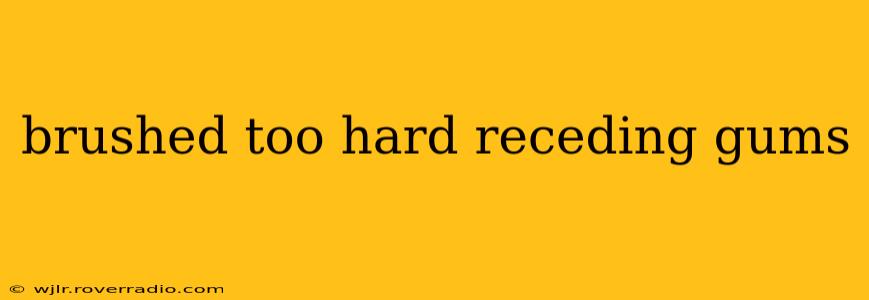Brushing your teeth is crucial for oral hygiene, but aggressive brushing can lead to a concerning problem: receding gums. This condition exposes the roots of your teeth, making them sensitive and vulnerable to decay. Understanding the causes and prevention strategies is key to maintaining a healthy smile.
What Causes Receding Gums from Brushing Too Hard?
Aggressive brushing is a major culprit behind receding gums. Using a hard-bristled toothbrush and scrubbing vigorously damages the gum tissue, causing it to pull away from the teeth over time. The abrasive action wears away the enamel and exposes the underlying dentin, leading to sensitivity and recession.
Is it only brushing too hard that causes receding gums?
No, while aggressive brushing is a significant contributor, other factors can also lead to gum recession. These include:
- Genetics: Some individuals are genetically predisposed to gum recession, regardless of their brushing technique.
- Gum disease (periodontal disease): This bacterial infection inflames the gums, leading to tissue breakdown and recession.
- Grinding or clenching teeth (bruxism): This puts excessive pressure on the gums, contributing to recession.
- Improper flossing technique: Aggressive flossing can also damage gum tissue.
- Hormonal changes: Fluctuations in hormone levels, particularly during pregnancy or menopause, can make gums more susceptible to recession.
- Certain medical conditions: Some underlying health conditions can increase the risk of gum recession.
- Smoking: Smoking impairs blood flow to the gums, hindering their ability to heal and resist recession.
How Can I Tell If I'm Brushing Too Hard?
Several signs can indicate you're brushing too aggressively:
- Bleeding gums: While occasional bleeding is normal, persistent bleeding after brushing is a warning sign.
- Sensitive teeth: Exposed dentin is highly sensitive to hot, cold, sweet, or acidic foods and drinks.
- Visible gum recession: You may notice your gums have pulled back, exposing more of your teeth.
- Red, swollen, or inflamed gums: These are signs of gum irritation and potential inflammation.
How to Brush Your Teeth Properly to Prevent Gum Recession
Proper brushing technique is crucial for preventing gum recession:
- Use a soft-bristled toothbrush: Hard bristles are too abrasive for your gums.
- Brush gently in small circular motions: Avoid scrubbing back and forth.
- Brush all tooth surfaces: Ensure you clean every surface of each tooth.
- Brush for two minutes twice a day: This is the recommended brushing duration.
- Replace your toothbrush every three to four months: Worn-out bristles are less effective and can be more abrasive.
- Consider an electric toothbrush: Many electric toothbrushes have built-in pressure sensors to prevent aggressive brushing.
What Should I Do If I Already Have Receding Gums?
If you've already noticed receding gums, it's essential to see a dentist or periodontist. They can diagnose the underlying cause and recommend appropriate treatment. Options may include:
- Scaling and root planing: This procedure removes plaque and tartar buildup from the teeth and roots.
- Gum grafting: This surgical procedure uses tissue from another area of the mouth to cover the exposed roots.
- Guided tissue regeneration: This procedure stimulates the regrowth of gum tissue.
Can Receding Gums Be Reversed?
While completely reversing significant gum recession might not always be possible, early intervention and proper oral hygiene can often halt further recession and improve gum health. Maintaining good oral hygiene and regular dental checkups are crucial for managing and preventing the progression of receding gums.
Conclusion
Receding gums are a serious dental problem that can lead to tooth loss if left untreated. By understanding the causes, recognizing the signs, and practicing proper brushing techniques, you can significantly reduce your risk of developing this condition. Remember to visit your dentist regularly for checkups and professional cleaning to maintain optimal oral health.
